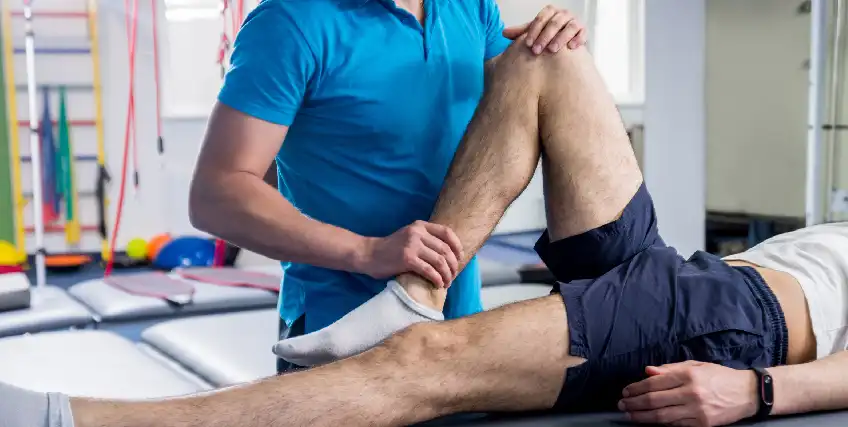Grow Your Clinic
With Physical Therapy Business Loans
Looking for Business Financing?
Apply now for flexible business financing. Biz2Credit offers term loans, revenue-based financing, lines of credit, and commercial real estate loans to qualified businesses.
Set up a Biz2Credit account and apply for business financing
The demand for physical therapy services in the U.S. is climbing fast. From post-surgery rehab to injury recovery, more people are turning to physical therapists for ongoing care. But for clinic owners, keeping up with that demand takes more than clinical skill; it takes serious financial support.
That’s where physical therapy business loans come in.
Whether you're starting a new business, expanding your facility, or upgrading old equipment, access to capital can help you meet growing patient needs while staying financially stable. From buying electrotherapy units to hiring qualified therapists, there are a lot of moving parts and they all cost money.
The average cost to open a physical therapy clinic can run between $10,000 and $100,000 depending on location and services offered. That doesn't include ongoing costs like payroll, insurance, or rent. Without the right financing, it's easy to fall behind.
But the good news? U.S. business owners now have more financing options than ever. From SBA loans to equipment financing to flexible lines of credit, clinics can tap into capital that supports both daily operations and long-term growth.
In the sections ahead, we’ll break down how physical therapy business loans can support your physical therapy practice, what lenders look for, and the smartest ways to use that capital. Whether you're just getting started or scaling up, there's likely a type of loan that fits your exact needs.
Why Clinics Rely on Physical Therapy Business Loans
Every physical therapy practice has different goals, but most share a common challenge: access to consistent capital. Whether you're launching a startup clinic or growing an existing operation, the right funding can help you cover high startup costs, expand services, and stay competitive.
Here are the most common reasons clinics seek out physical therapy business loans:
Startup Costs for New Clinics
Starting a physical therapy clinic is exciting, but it's also expensive. From leasing a commercial space to securing business licenses, upfront expenses add up fast. Add in therapy equipment, EHR software, signage, and furniture, and you’re easily looking at tens of thousands. Many new clinic owners use a loan for physiotherapy clinics to get off the ground without draining their savings. The right loan helps you launch smoothly, manage overhead, and focus on building your client base from day one.
Purchasing or Upgrading Equipment
From ultrasound machines to resistance systems, equipment is the backbone of a successful clinic. But high-quality gear isn't cheap. Replacing outdated tools or investing in new rehab technology can improve outcomes and efficiency, but it takes money. Many business owners turn to equipment financing to spread these costs over time. This lets you invest in better patient care without tying up your working capital or credit lines.
Hiring Physical Therapists and Staff
Even if you’re a solo practitioner now, growth usually means bringing on more licensed physical therapists, assistants, and administrative support. Payroll is one of the largest ongoing expenses for any healthcare business. Using physical therapy business loans to cover salaries during growth periods helps you stay fully staffed without cash flow issues. This ensures better patient experience and long-term retention.
Marketing Campaigns to Attract Clients
Your clinic may be top-notch, but if people don’t know you exist, it’s tough to grow. Marketing takes money - whether it’s building a website, running Google Ads, or launching referral programs. A short-term loan or business line of credit can fund campaigns that bring in new clients fast. And when done right, these efforts pay for themselves. Many use business loans for therapy clinic outreach efforts during slower seasons.
Expanding or Renovating the Facility
More patients mean more space. Whether you're knocking down a wall or opening a second location, expansions come with construction, design, and compliance costs. These aren’t easy to cover upfront, especially when rent and payroll are still due. That’s why many practice owners use financing for physical clinic renovations. With the right capital, you can grow your space without disrupting operations or taking on unnecessary debt.
Popular Financing Options for Physical Therapy Businesses
Every physical therapy business has unique goals. Whether you're buying equipment or expanding your space, different funding options serve different purposes. Choosing the right type of physical therapy business loan can improve cash flow and protect your long-term financial health.
Here are the most common options for physical therapy business loans used by physical therapy practice owners today:
Term Loans
A traditional term loan is ideal for one-time purchases like clinic renovations, new therapy equipment, or hiring staff. These loans offer fixed repayment terms and predictable monthly payments, making them easier to manage within your clinic's budget. Many clinics use term loans to finance upgrades or expansions without hurting their day-to-day operations.
SBA Loans
Backed by the Small Business Administration, SBA loans are a popular choice among clinic owners with solid credit. They offer longer terms, lower interest rates, and higher loan amounts than most private lenders. However, approval can take time and requires strong documentation. SBA 7(a) loans are commonly used for working capital, equipment, or even buying commercial real estate.
Business Line of Credit
A business line of credit gives you flexible access to capital as you need it. Use it to manage short-term needs like payroll, inventory, or marketing campaigns. You only pay interest on the amount used, not the total limit. It's a strong safety net for any physical therapy practice dealing with unpredictable cash flow.
Equipment Financing
If you need to buy or lease therapy tables, ultrasound machines, or gait trainers, equipment financing spreads the cost over time. The gear itself usually serves as collateral, which makes approval easier for newer businesses. This loan type helps conserve working capital while keeping your clinic up to date.
Merchant Cash Advances
Merchant cash advances provide fast access to funds in exchange for a portion of your future credit card sales. They’re easier to qualify for than other loans, especially for clinics with lower credit scores. But be cautious; interest rates can be much higher, and daily repayments may strain your cash flow.
How Lenders Evaluate Physical Therapy Business Loan Applications
Before you apply for a business loan online, it’s important to understand what lenders evaluate. Your clinic’s finances, history, and plans all play a role in the approval process and final repayment terms.
Here’s what most lenders consider when reviewing applications for physical therapy business loans:
Credit Score
Your credit score is one of the first things lenders will check. It shows how well you manage debt and impacts your interest rates. While many loan options require a score above 650, there are programs for those with lower scores. A strong credit history - both personal and business - can improve your chances for better terms and faster approval.
Monthly Revenue and Cash Flow
Consistent income proves your clinic can afford monthly payments. Lenders want to see steady cash flow and strong sales history over the past 3–12 months. If you're applying for a business line of credit or working capital loan, stable revenue makes approval more likely. Positive financial statements also help your case by showing healthy operating margins.
Time in Business
The longer you’ve been operating, the more confidence lenders have in your physical therapy practice. Most providers prefer at least 6–12 months of history. However, if you're a startup, you may still qualify for certain funding options with strong revenue or a solid business plan.
Business Plan and Use of Funds
A well-structured business plan shows how you intend to use the capital and how it will benefit the clinic. Whether you're planning to upgrade equipment, launch a new service, or expand your space, a clear use case builds lender trust. It also helps you avoid overborrowing and stay focused on your true business needs.
Pros and Cons of Taking Out Physical Therapy Business Loans
Getting a physical therapy business loan can be a smart move, but it’s not risk-free. Every physical therapy business should weigh the upside against the long-term impact on cash flow, debt, and operations.
Here’s a breakdown of the key pros and cons of using physical therapy business loans to meet your business needs:
Pros of Physical Therapy Business Loan
Access to Quick Capital
Whether your air conditioning fails or you need last-minute supplies, having fast funding on hand helps. Many lenders offer short-term or working capital loans that are are funded in a short time. For small business owners, this kind of flexibility keeps operations steady and prevents downtime. It’s especially useful when you can’t afford delays in patient care or staff payments.
Supports Business Growth
Loans make it possible to scale faster. You can open a second location, hire more physical therapists, or invest in new services. With the right type of loan, you don’t have to wait months or years for your cash reserves to grow. Instead, you can meet demand now and increase revenue faster than bootstrapping would allow.
Improves Cash Flow Stability
If your clinic experiences seasonal dips or billing delays, loans help balance out gaps in income. Using a business line of credit or working capital loan gives you breathing room to cover recurring costs. This protects your team, patients, and reputation, without cutting corners or pausing growth plans.
Cons of Physical Therapy Business Loan
Repayment Obligations
Once you accept the loan, monthly payments become non-negotiable. If revenue slows down, this can put strain on your clinic’s cash flow. It’s important to plan for repayment and ensure your income can support it, especially if you're using merchant cash advances or high-rate funding.
High Interest Rates for Riskier Borrowers
If your credit score is low or your clinic is brand new, you may only qualify for higher-rate loan options. Over time, that adds up. Some business financing options charge APRs that far exceed traditional term loans or SBA loans. Always compare interest rates and read the fine print.
Risk of Overborrowing
Too much funding can be just as risky as too little. If you take out more than your clinic needs or can afford to repay, you may struggle with debt long after the money’s been spent. Stick to your business plan, set realistic goals, and borrow based on actual projections.
How to Apply for Business Loan Online
Applying for physical therapy business loans is easier than ever. With online platforms and faster processing, you can access funds faster. But a smooth application starts with preparation.
Here’s how to get started and improve your chances of approval when you apply for business loan online:
Understand Your Business Needs
Before you fill out any forms, take a step back. What are you actually trying to fund? A loan for physiotherapy clinic expansion looks different from a loan to cover therapy equipment. Knowing your purpose helps you choose the right type of loan, whether that’s equipment financing, working capital, or a business line of credit.
Organize Financial Documents
Lenders want proof your clinic can handle repayment. Be ready with tax returns, bank statements, financial statements, and business licenses. Some lenders may also ask for lease agreements or vendor quotes, depending on your specific needs. Strong documentation builds credibility and shortens approval time.
Research Loan Types
Don’t just apply for the first offer you see. Compare financing options based on term length, interest rates, and repayment terms. SBA loans are great for established practices, while merchant cash advances may be more accessible for startups. Check trustworthy sources like U.S. Small Business Administration and Experian.
Compare Offers
Each lender has different criteria and pricing. Don’t just focus on the interest rate; review total loan costs, fees, and penalties. Look for flexibility in repayment or early payoff options.
Submit Your Application Online
Once you’ve picked up your loan, apply through a secure portal. You’ll enter business details, upload documents, and review terms before accepting. Many small business owners get pre-approved in minutes, and full approval within a few days.
Smart Ways to Use Financing in a Physical Therapy Clinic
Getting funded is just the beginning. How you use capital makes all the difference. The goal should always be to create long-term value and not just patch short-term gaps.
Here are smart ways to make your physical therapy business loans work harder for your clinic:
Expand Patient Services
Use your loan to offer specialized treatments like post-op rehab, vestibular therapy, or sports injury recovery. These services not only bring in new patients but also set your clinic apart from nearby providers. Offering niche programs helps increase revenue per visit while improving overall patient care. If you already have the space, a small investment in therapy equipment and training can generate big returns.
Invest in Equipment That Saves Time and Improves Outcomes
Upgrading your current tools can boost efficiency and improve treatment results. Whether it’s electric stimulation machines, gait trainers, or therapeutic ultrasound systems, modern equipment supports better outcomes and higher patient retention. Instead of paying upfront, many clinics use equipment financing or a business line of credit to manage costs while preserving working capital.
Upgrade to a Larger or Second Location
If your patient volume is outgrowing your space, it might be time to expand. Whether you buy a new building with commercial real estate financing or renovate your existing layout, strategic expansion can improve workflows and increase appointment capacity. Many practice owners use business loans to cover permits, contractors, and interior upgrades without disrupting day-to-day operations.
Trusted by Thousands of Small Business Owners in America.**
Simply because we get what you go through to build a business you believe in.
**Disclaimer: All stories are real, as told by real business owners. Customers do not receive monetary compensation for telling their stories.
From One Entrepreneur to Another: We Get You
We understand what's behind building a business you believe in.
All stories are real, as told by real business owners. Customers do not receive monetary compensation for telling their stories.



Articles on Loans for Physical Therapy Centers
How Physical Therapy Clinics Can Use Loans to Grow and Scale
In today’s time, physical therapy clinics do more than just providing expert treatment.
Equipment Leasing for Physical Therapists: What You Need to Know
Operating a physical therapy clinic requires efficient tools that support healing, function, and comfort.
Startup Loans for New Physical Therapy Practices
Great physical therapists may feel that the next logical step in their career development is opening their own physical therapy practice.
Frequently Asked Questions on Physical Therapy Business Loans
1. Can I get a loan for my clinic if I’m just starting out?
Startups can qualify for a loan for a physiotherapy clinic through programs like SBA loans, equipment financing, or merchant cash advances. Just be ready with a strong business plan and personal financial history.
2. Can I finance used therapy equipment?
Many equipment financing programs allow you to buy used equipment. Just make sure the gear meets safety and compliance standards.
3. Is invoice factoring a good financing option?
Invoice factoring allows you to borrow against outstanding invoices; it is handy when insurance delays affect cash flow.
4. What types of financing options are there beyond SBA and term loans?
Other options include alternative loans, revenue-based financing, and invoice factoring tailored for healthcare businesses
5. Is collateral always required?
Not always. Some working capital loans are unsecured. But equipment financing and real estate loans usually require collateral .
Frequent searches leading to this page
Term Loans are made by Itria Ventures LLC or Cross River Bank, Member FDIC. This is not a deposit product. California residents: Itria Ventures LLC is licensed by the Department of Financial Protection and Innovation. Loans are made or arranged pursuant to California Financing Law License # 60DBO-35839



